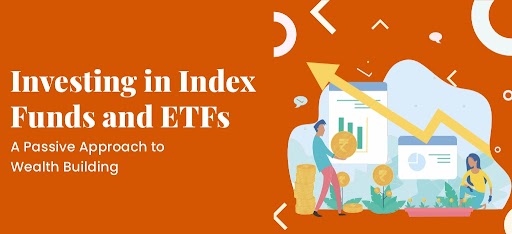
- Stock Market
- Nov 23, 2024
- 5 Mins Read
Investing in Index Funds and ETFs: A Passive Approach to Wealth Building

While progressing as a stock market trader or investor, you will come across various types of funds. Two of the most popular ones are index and Exchange-Traded Funds (ETFs). Let’s discuss them in this blog.
What are Index Funds and ETFs?
An index fund is a mutual fund that holds all the securities in a particular index. It tracks the performance of a specific index.
In index funds, the fund manager creates a portfolio similar to the elements of a selected index. It involves minimal trading as it aims to mirror the index.
These funds are available via brokers or through mutual fund companies.
ETFs also are like index funds. However, the only difference is that they are traded on stock exchanges like individual stocks.
ETFs also have low expense ratios, although you may have to pay some trading commissions. Besides, the price varies throughout the trading day just like stocks.
Some reasons these funds have become popular include low expense ratios, fewer transaction costs, instant diversification, increased transparency, and better liquidity.
Concept and Benefits of Passive Investing
Passive investing aims to replicate the performance of a particular index or benchmark, instead of actively choosing individual securities. It is a long-term investment approach with minimal trading and lower fees.
- Investors choose passive investing for the following reasons.
- Accumulating wealth over decades.
- Paying minimal fees.
- Reducing risk by diversifying.
It is popular among beginners who wish to adopt a low-maintenance strategy.
Check Out - Right Share Market Course for Your Investment Goals?
What Are Index Funds and ETFs - In Detail
While we’ve already seen the basic definition of index funds, let’s see how they, as mutual funds, replicate the performance of a particular index.
The fund buys all or most of the securities of the index in proportions same as the index. But if the index has numerous securities, the fund chooses the closest-matching sample that matches the index’s risk and return attributes.
Indices undergo periodic updates per market changes. Thus, the fund’s portfolio also undergoes adjustments and alignments.
The index fund reinvests dividends to match the index’s growth.
Trades happen only during index changes. Thus, the fund minimizes expenses by reducing turnover.
Let’s now talk about ETFs.
ETFs trade like stocks on exchanges as you can buy or sell them during the trading day. Traders can see them on major stock exchanges with a ticker symbol to identify them.
These funds offer the flexibility of trading at any time while the market is open. The prices keep varying depending on supply, demand, and underlying asset value.
ETFs also have a bid price (the highest price a buyer is willing to pay) and an ask price (the lowest price a seller can accept). The difference between both is called spread.
Investing in index funds and ETFs has unique benefits. Let’s look at them next.
Advantages of Investing in Index Funds and ETFs
Let’s go through some benefits of investing in index funds and ETFs.
- Low Fees: Both these funds usually have lower expense ratios than actively managed funds as they demand less on-hand management. Besides, they have lower fees and are traded like regular individual stocks. That helps avoid some costs associated with mutual funds.
- Diversification: ETFs and index funds track various securities like the entire market index. Such diversification helps reduce the risk of losses attached to a single stock or a specific sector.
- Simplicity: Investing in ETFs or index funds is pretty simple. The research and management requirements are minimal. Additionally, you can choose ETFs or index funds customized to specific sectors, etc.
Choosing the Right Fund
Apart from the basic checks and assessments, here’s what you should evaluate while choosing the right index or exchange-traded fund.
- Understand the Index: ETFs trade like stocks, while index funds track an index and trade at the end-of-day price. Additionally, you must know which index the fund tracks.
- Check Fees: Search for funds with low fees as the fees reduce your returns considerably. Compare various funds and choose the one with low fees.
- Performance Tracking: Additionally, assess the fund’s performance. You can look at its historical performance, although it doesn’t guarantee future results. Furthermore, see how well the fund tracks its index.
Tax Efficiency of ETFs
Let’s look at some tax-related aspects of ETFs.
-
Capital Earnings or Gains from Equity ETFs
If you hold the ETFs for less than a year, the profits count as short-term capital gains, requiring you to pay 15% u/s 111A of the Income Tax Act 1961.
However, if you hold the ETFs for more than a year, the profits will be considered long-term capital gains. These gains are exempt up to the limit of Rs. 1,00,000.
Long-Term capital gains Above this limit attract a 10% tax.
-
Capital Earnings from Balanced ETFs (with 35% to 65%
equity investments)
If you sell your holdings in such balanced ETFs within three years, the profits will count as short-term capital gains. They are added to your total income and you pay taxes on them per the applicable tax slab.
Profits earned from ETF holding of over three years are categorized as long-term capital gains. The tax rate is 20% (with the indexation advantage).
-
Capital Gains from Non-Equity ETFs and Balanced ETFs
The capital gains you earn from non-equity ETFs and balanced ETFs (with less than 35% equity investments) will be considered short-term capital gains. You will pay the tax per the applicable income tax slab rate.
The Role of Index Funds and ETFs in a Diversified Portfolio
Both fund types play a role in helping you diversify your portfolio in the below ways.
-
Tracking various asset classes like real estate, bonds, commodities, etc.
-
Providing exposure to international markets, including developing economies.
-
Broad sector coverage, including energy, healthcare, technology, etc.
-
Spreading investments across various securities and reducing risks. .
Strategies for Investing in Index Funds and ETFs
Let’s look at the strategies you can adopt while investing in index funds and ETFs.
-
Dollar-Cost Averaging
It involves purchasing a fixed-dollar amount of an asset on a regular schedule, even if the asset’s cost keeps changing. It proves a smart strategy for beginners who can invest a minimum amount every month. Besides, by investing the same dollar amount in your ETF every month, you will gather more units at a low price and fewer units at a high price. This strategy can prove advantageous in the long run. -
Rebalancing
This is a generic strategy that involves reviewing your portfolio periodically and adjusting it based on price overall market movements.
Of course, it requires attending stock market classes in Pune to learn strategies and implement them independently.
Risks and Considerations
ETFs and index funds aren’t merely about benefits. As with every other investment option, they have their unique risks. As a trader or investor, you must know them.
- Market Risk: Both funds usually track market index performance. If the respective market or index falls, the investment value also drops.
- Tracking Error: It can happen when the fund’s performance moves away a little from its benchmark index due to timing, expenses, or liquidity concerns.
- Liquidity Risk: ETFs trade on exchanges, and low trading volume can make it more challenging to sell without changing the price. On the other hand, index funds are traded intraday. Redemptions take place at the fund’s Net Asset Value, thus potentially limiting flexibility in fast-paced markets.
- No Active Management: These funds aim to imitate market performance but don’t outperform it. In markets with many ups and downs, actively managed funds may offer better capital protection.
- Dividend Risks: Some funds pay dividends but are not guaranteed. Companies within the index may reduce dividends during economic problems.
Conclusion
Passive investment through index funds and ETFs is a long-term wealth-building strategy. Mastering this strategy by undergoing formal stock market classes in Pune can help you adopt the right approach and make the most of your investments.
So, why wait? Enroll in Wealth Note and join our comprehensive courses. Call us at +91 7068001919 to learn more about our courses and curriculum.